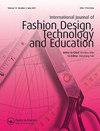学生对基于工作室和基于虚拟现实的服装设计课程远程教学的态度
IF 2.2
Q3 BUSINESS
International Journal of Fashion Design, Technology and Education
Pub Date : 2023-11-10
DOI:10.1080/17543266.2023.2278630
引用次数: 0
摘要
摘要:本研究在一个学期的时间里,对服装设计专业的学生进行了基于工作室和虚拟现实的在线教学。通过计算机自我效能感和空间学习能力来衡量学生对这两门课程的远程学习满意度。对远程学习的感知有用性和学生在线参与分别作为中介和调节因素进行了测试。本研究发现,空间能力技能对学生对远程工作室课程的满意度有显著影响。相比之下,对于基于虚拟现实的课程来说,这一点并不重要。另一方面,学生的计算机自我效能感直接影响虚拟现实远程学习课程的感知有用性,并间接影响课程满意度。然而,这种关系并不存在于以工作室为基础的课程。关键词:虚拟现实、远程教学、设计教育、虚拟服装、虚拟时尚披露声明作者未报告潜在利益冲突。本文章由计算机程序翻译,如有差异,请以英文原文为准。
Students’ attitude towards distance teaching of studio-based and virtual reality-based fashion design courses
ABSTRACTIn this study, studio-based and virtual reality-based courses were taught online to fashion design students during a semester. Students’ satisfaction with distance learning in these two courses was measured by relating to their computer self-efficacy and spatial learning capability. The perceived usefulness of distance learning and students’ online engagement were tested as the mediator and moderator, respectively. This research showed that spatial ability skills play a significant role in students’ satisfaction with the distance learning of a studio-based course. In contrast, it is not significant for the virtual reality-based course.On the other hand, students’ computer self-efficacy directly affects the perceived usefulness of distance learning of the virtual reality-based course and indirectly affects course satisfaction. However, this relationship does not exist for the studio-based course.KEYWORDS: Virtual realitydistance teachingdesign educationvirtual garmentsvirtual fashion Disclosure statementNo potential conflict of interest was reported by the author(s).
求助全文
通过发布文献求助,成功后即可免费获取论文全文。
去求助
来源期刊

International Journal of Fashion Design, Technology and Education
Arts and Humanities-Visual Arts and Performing Arts
CiteScore
3.10
自引率
0.00%
发文量
36
 求助内容:
求助内容: 应助结果提醒方式:
应助结果提醒方式:


